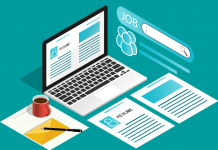What is your edge among other applicants? What makes you different from the others? Why should I hire you over the other candidates?
A nerve-wracking interview question with many variations, which, if you mess up, could potentially land you to the recruiter's forgotten list. Being the prepared applicant that you are, you don't want that to happen, and you certainly can't just wing it out and hope for the best. Hence this article.
The difference between, "What are your strengths?" and "What is your edge among other applicants?"
Some applicants confuse, "What are your strengths?" to "What is your edge among other applicants"?
Both talk about strengths in the workplace; but you see, these two interview questions have one distinct difference.
"What is your edge among other applicants?" asks about the difference between you and the other applicants. Therefore, your answer should be unique as much as possible that it makes you stand out from the crowd.
The best way to mess this question up is to state a strength that's common. Worse, the interviewer will end up asking you a follow-up question and say, "Well, everybody says they're hardworking. In fact, the last ten applicants have been telling me that. Do you have that something that the other applicants don't, that would make me wanna choose you?
Therefore, the key in answering, "What is your edge over the other applicants?" is the differentiation.
On the other hand, "What are your strengths?", asks about your strength without requiring you to explain why you're better or different from the others. You simply state your strengths and be done with it.
Here's how to answer: What is your edge among other applicants
1.) Create a list of the job's required skills.
For example, you're applying for a Customer Service Representative position in a call center. What are the key strengths and skills that an excellent CSR has? A CSR needs to be:
- Thorough(companies don't want their customers to call repeatedly due to incomplete information given by their CSRs)
- Patient (even with the irate customers, especially the irate ones)
- Flexible (because the company's policies and your work schedule will change all the time)
- Persuasive and able to use positive language (because a CSR just can't say no to customers without giving an alternative solution)
- Polite but firm (being polite without being firm is a no-no when dealing with difficult customers)
2.) Create a list of your strengths that match the job description.
Now, write down all the strengths and experiences you have had that you think could contribute greatly to becoming a CSR. Once done, arrange them in descending order, starting with your top two strengths/ professional experience that describes you the most.
Using myself as an example, I came up with these:
My experience with handling customers: My first two jobs before call center already involved customers: cashier in a mall and a service crew in a milk tea store.
At 18, I already encountered all sorts of customer personality—from friendly, to calm, to I-don't-care-what-you-do-just get-the-job-done-customers, to irate, even the hysterical ones. These experiences taught me how to deal with any types of customers efficiently without all the drama.
I am very thorough with my job: As a CSR, I hate it when customers repeatedly call Customer Service because the previous agent didn't give all the info they need.
As a customer, I hate it when the agent gives answers that requires me, the customer, to do the probing and ask the right questions so I can get to the resolution, when instead, the CSR should be the one doing it for me.
Therefore, I know how frustrating it is to experience a crappy customer service so when I deal with customers, I make sure that I give the best service I could possibly give.
3.) Blend the job's requirements and your strengths.
Now that both ingredients are prepared, this is the part where you do the mixing and blending; the part where you connect the company's requirements to the strength that you are most proud of.
How to arrange your answers
Now, before the sample answer, let me tell you that I created this answer based on the PREP format:
- Point
- Reason
- Explanation/ Elaborate
- Point.
PREP is especially useful for non-native English speakers who find it hard to express and organized their thoughts in English before speaking.
If you want to know more about PREP, read this article: How to Express Your Thoughts in English Painlessly.
Example
For example, if I use my list of skills and experience from my list: My experience with handling customers and I am thorough with my job, here's how I'd craft my answer:
Point
The reason you should hire me is because I am very thorough with my job and an expert in the customer service field. Customer Service is what I've been doing since I was 18, I've encountered different types of customers, and I know very well the common frustrations that customers deal with when calling Customer Service.
As a CSR, I feel unproductive when customers repeatedly call Customer Service because the previous agent didn't give the complete info. It's bad news for the company and the customer. As an agent, I make sure to avoid this problem.
Reason (explains why being an expert in customer service is important)
Because as a customer who have called many customer service hotline before, I can say that only very few of them offer excellent service. And I don't want to be one of those agents who just go to work, eat lunch, and look forward to the end of shift. I do what I'm paid to do.
Elaborate/ Explain (Explain why you think excellent customer service is rare by telling a story based on experience or a realistic scenario that the recruiter could relate to.)
For example, one of the most common issue I notice that most agent have is this: when they tell customer no, they wait for the customer to ask for the alternative resolution instead of revealing it as soon as possible.
They usually go on and on describing how and why the customer is doing it wrong, why the solution she's asking isn't possible, but doesn't provide another option until the customer asks, "Okay, now what?"As a result, they're leading the customer to focus on the problem now, and on the resolution later, or not at all. This is bad if the company is aiming for a higher customer satisfaction and a short AHT (average handling time).
Point (reiterate the first point but in different words)
So the reason you should hire me is because you will never encounter those problems with me as your CSR. I've dealt with customers and clients in North America and Australian clients (insert the continent of your past customers) before and I know they expect nothing but first class customer service from something they pay for. And the way I make sure of that is to never let a customer hang up the phone dissatisfied or more confused than they were when they dialed the call."
Why this is effective
1.) Differentiation, check.
It just didn't highlight you as an expert of the field (the strength) but it also highlights you as a rare find by telling a story of your repeated encounter with poor customer service as a customer yourself and as an agent.
You're basically telling the recruiter this:
Hey just so you know, I know how common it is to have a crappy CSR working for you. My proof? As a CSR in four years, I've talked to plenty of frustrated customers who repeatedly call when they could have gotten all info from the first contact.
What's worse? From a customer perspective, I think the customer service industry is hopelessly useless.
The best part? I can help you with that. And no, you can't just choose any applicants out there if you want a high customer satisfaction, lower handling time, and a CSR who knows her thing. Not only I have experience, but I take my job very seriously.
Of course you're not really gonna say that to the interviewer, but that's pretty much the meaning of your answer in a nutshell.
2.) It has proof.
If you want to convince the interviewer, you don't just blurt out ten positive traits about you without supporting any of those traits.
Notice that in this answer, there's only two skills mentioned: experience and expertise. The rest of the answer is spent telling a story that serves as proof of your experience and expertise by a.) telling a story of your experience as a customer and b.) telling a story of your experience as an agent which by the way, all call center companies can relate to: customers repeatedly calling because of incomplete info.
What if you don't have a job experience?
Here's a sample answer if you're a fresh graduate and don't have a prior work experience.
Point
Before I decided to apply in (insert company name), I made sure that your requirements align with my skill sets. As I understand, you're hiring Customer Service Representatives to answer customer's inquiries and help them with their concerns.
That's the obvious part. The less obvious part is this: you're not only looking for someone to help your customers. You're also looking for motivated employees who can help promote the name of the company to your customers; not some employees whose only motivation for coming to work is lunchtime, paycheck, and log out.
Reason
The reason you should hire me is because I understand what customer service exactly means at its core and I have the drive to take the challenge that comes with it.
Elaborate/ Explain
I have no job experience, as you can see in my resume, but my years in school have instilled in me a sense of responsibility necessary for adult and professional life.
By going the extra mile for the customers, by wearing a smile to add more warmth to the interactions, by putting myself in the customer's shoes, by making the customers feel that I care about their frustrations, I am, in a way, promoting the company's image.
Point
So the reason you should hire me is because I am driven to not only get the job done, but to also understand customers and connect to them in a deeper level and promoting the company's name in the process.
Why this is effective
- It shows that you deeply understand the responsibilities of working in customer service by saying that helping customers isn't only what customer service is all about; it's also about connecting to them and making them feel heard, which in turn affects the company's brand positively.
- Although there's no job experience to talk about, the answer highly focuses on what you, the applicant, could positively do for the company once hired.
What if I'm competing with applicants who have work experience?
If you're competing with other applicants who have prior job experience, the employer will likely choose the applicant with the experience. And that is fine. That means your best option is to apply for a lower position that will soon qualify you for the position you are originally applying for.
That said, giving your best answer to this interview question doesn't guarantee that you'll get chosen over other candidates as your answer is only one part of a bigger criteria.
When does your answer make a big impact over your application
Your answer will make a big impact if:
- you're competing with applicants who have roughly similar professional accomplishment as you do (example: fresh graduate, no job experience).
- if the company is mass hiring and will need a lot of employees to fill the position.
One more thing: How you say it is more important than what you say.
Note that your confidence in delivering the answer contributes a lot. You can name drop a lot of names and job experience but the fact remains that delivering your answer as if you're on top of your game is very important; and without it, your answer will amount very little to nothing.
You might wanna read:
- 32 Mistakes Job Applicants Should Avoid to Land the Job
- Job Hunting Tips for Beginners
- How to Improve Your English Accent and Land a Call Center Job
Hope this helps.






